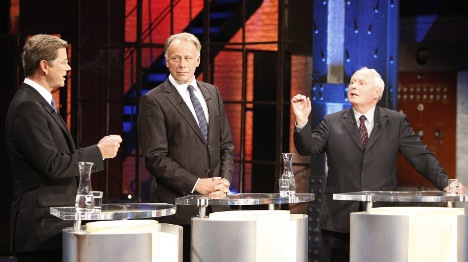Upset they had been excluded from Sunday’s televised debate between Merkel and her main challenger Frank-Walter Steinmeier, the leading parliamentary candidates from the pro-business Free Democrats (FDP), environmentalist Greens and hard-line socialist party The Left gathered for their own verbal jousting session in Berlin on Monday night.
It became quickly apparent the only thing FDP’s Guido Westerwelle, the Greens’ Jürgen Trittin and Oskar Lafontaine from The Left could agree upon was that Merkel’s grand coalition between her conservative Christian Democrats (CDU) and Steinmeier’s centre-left Social Democrats (SPD) should not continue for another term.
“We want to end the grand coalition and prevent a left-wing government,” said Westerwelle.
But aside from Westerwelle’s dwindling hope the FDP can supplant the SPD as Merkel’s junior coalition partner, none of the opposition leaders could imagine cooperating with each other to offer German voters another option.
With five political groups in parliament and the country’s two main parties winning an ever-smaller share of the vote, Germany politicians have been confronted with the possibility that a three-way coalition might be necessary to form any government other than another right-left grand coalition.
The two realistic coalitions would be either the so-called Ampel, or “traffic light,” grouping of the SPD (red), FDP (yellow), and the Greens, or the “Jamaica” colours of the CDU (black), FDP, and the Greens.
But the representatives from smaller parties on Monday essentially kyboshed their only chances at joining the government after the election in two weeks.
“The steamer will not set off for Jamaica,” said Trittin, explaining the Green refused to help the conservatives and FDP to power.
But Westerwelle was equally against the idea of making Steinmeier chancellor in an alliance with the SPD and Greens.
“I’m completely clear on this question – if I had wanted to govern in an Ampel I would have done it long ago,” Westerwelle said.
The intransigence of the FDP and the Greens to work together greatly increases the likelihood Merkel will remain chancellor and Steinmeier her foreign minister after September 27.
Especially since the only other option to avoid prolonging the grand coalition – a “red-red-green” alliance between the SPD, The Left, and the Greens – remains unthinkable at the federal level as long as the leftists stick to domestic and foreign policies widely considered unreasonable. And Steinmeier has repeatedly said the SPD will not seek to oust Merkel from the Chancellery with the support of The Left.
Probably all too aware that his leftists will play no role in preventing Merkel from staying in power, Lafontaine quipped towards the end of Monday night’s debate: “Sometimes it’s merciful to be in opposition.”


 Please whitelist us to continue reading.
Please whitelist us to continue reading.
Member comments